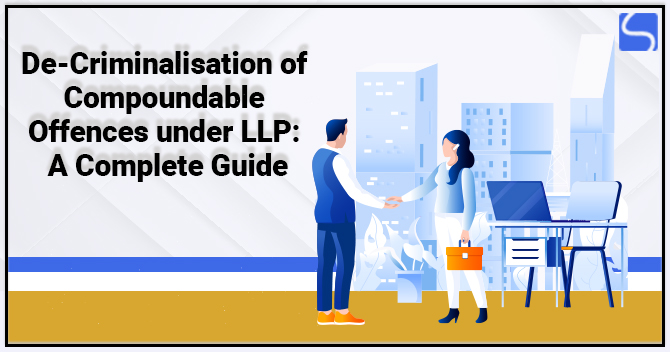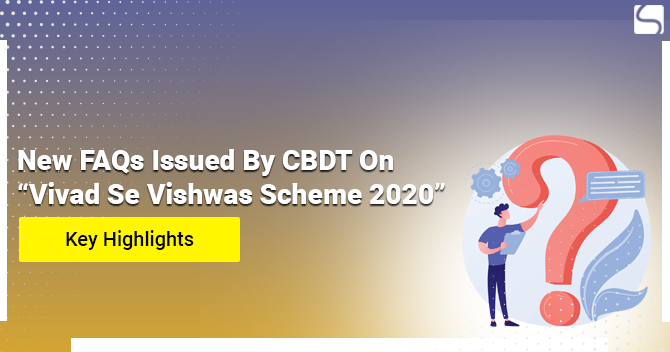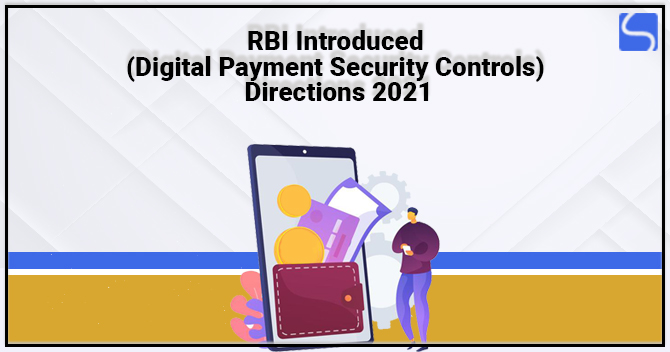De-Criminalisation of Compoundable Offences under LLP: A Complete Guide

Shivani Jain | Updated: Feb 09, 2021 | Category: Limited Liability Partnership, News
The Union Finance Minister and Corporate Affairs, Ms Nirmala Sitharaman, while giving Budget Speech for the Financial Year 2021-2022 on Monday, had proposed several reforms and schemes for Small Companies and MSMEs. The main behind such schemes and measures is to strengthen and uplift the Start-up Ecosystem. Further, the same includes, De-criminalisation of Compoundable Offences under LLP as well.
In this blog, we will discuss in detail about the De-criminalisation of Compoundable Offences under LLP.
Table of Contents
Concept of Limited Liability Partnership
The term LLP or Limited Liability Partnership denotes an alternative corporate business format that offers benefits of a Private Limited Company and flexibility of a Partnership Firm. Further, it shall be significant to take into consideration that this business structure enjoys the benefit of Separate Legal Entity and Perpetual Succession.
Furthermore, the term LLP Agreement means the Magna Carta of the firm. It includes all the rules and regulations, activities, operations, management, profit sharing rations, obligations, etc., concerning the firm and the partners in it.
Also, to obtain LLP Registration in India, one needs to file an application under the provisions of the Limited Liability Partnership Act 2008.
Also, Read: Why Startups Choose LLP to Start Business in India?
Concept of De-Criminalisation of Compoundable Offences under LLP
The term De-criminalisation of Compoundable Offences under LLP means a process, which is based on the recommendations of CLC (Company Law Committee), headed by Mr Rajesh Verma, Company Affairs Secretary, Ministry of Corporate Affairs. Further, the said concept has followed the roots of Technical and Procedural Compoundable Offences under the provisions of the Companies Act 2013.
Also, the point to consider regarding the De-criminalisation of Compoundable Offences under LLP are as follows:
- In total 12 Offences have been proposed to be decriminalised;
- 1 provision, i.e., section 73, providing Criminal Liability has been proposed to be omitted;
- Transfer of 12 Decriminalised Offences to IAM (In-House Adjudication Mechanism) to reduce the burden of routine cases on criminal courts;
Purpose of De-Criminalisation of Compoundable Offences under LLP
The main purpose behind the implementation of De-Criminalisation of Compoundable Offences under LLP can be summarised as:
- To Encourage and Inspire Youth to take up Entrepreneurship;
- To Remove the Fear of Criminal Prosecutions for Procedural Omissions, Non-substantive Minor, and Commissions during the normal course of business transactions;
- To Eradicate the Criminality of Offence from Business Laws, wherein no ill intentions are involved;
- To Ensure Ease of Doing Business for Law abiding LLPs;
Principles of De-Criminalisation of Compoundable Offences
The three main principles on which the concept of De-Criminalisation of Compoundable Offences under LLP has been formulated are as follows:
Principle 1
The offences of minor or less serious nature will now be shifted or transferred to the IAM (In-house Adjudication Mechanism) framework, instead of considering them as Criminal Offences.
Principle 2
The offences which are suitable to be dealt under some other laws, has now been proposed to be omitted from the Limited Liability Partnership Act 2008.
Principle 3
The occasions which include offence of serious nature, such as follows, will continued to be dealt with the existing provisions:
- Fraud;
- Intent to Deceive;
- Injury to Public Justice;
- Non-compliance of any Order or Direction passed by the Government Authorities;
Concepts Introduced for Promoting Ease of Doing Business
The concepts introduced for promoting the Ease of Doing Business are as follows:
Small Limited Liability Partnership
The government is seeking to implement a new class of LLP named “Small Limited Liability Partnership” or “Small LLP”. The benefits offered to a Small LLP are as follows:
- Lesser Compliances;
- Lesser Registration and Additional Fee;
- Lesser Penalties in case of any default;
Also, it shall be significant to take into consideration that the feature of Lesser Compliance will enable the Micro and Small partnerships to get registered as LLP which has comparatively more organised structures.
Issuance of Non Convertible Debentures
It shall be considerate to take into the record that the Ministry of Corporate Affairs (MCA) has allowed LLPs to raise capital by way of issuing Non Convertible Debentures to the Investors, who are regulated either by RBI or SEBI or both. Further, such a permission will act as an alternative to Equity Participation.
The benefits of such an initiative are as follows:
- It will Improve the Deeping of Debt Market;
- It will Enhance the Capitalisation of LLPs;
Reduction in the Additional Fees
MCA has decided to relax the additional fees levied on LLPs by amending the provisions of section 69 of the Limited Liability Partnership Act 2008. Further, the relaxation given in the levy of additional fees can be summarised as, the fee of Rs 100 charged on the delayed filing of documents and forms has been relaxed.
Also, the main benefit of this relaxation is that LLPs will now able to file their documents, returns, and records in a smooth manner, which will directly ensure updated registry for policy making and proper regulation.
Conclusion
In a nutshell, based on the recommendations of CLC (Company Law Committee), the concept of De-Criminalisation of Compoundable Offences was introduced by the government. The same aims to promote the initiative of Ease of Doing Business. Also, such an amendment will benefit around 1.45 lakh registered LLPs in India, and most of them belong to the class of SMEs (Small and Medium Scale Enterprises).
Lastly, in case of any other doubt or complexity, contact Swarit Advisors, our proficient experts are there to provide you a solution for every problem and will ensure you LLP registration in the most hassle free and straightforward manner.
Also, Read: MCA Extends the Due Date under LLP Settlement Scheme 2020














